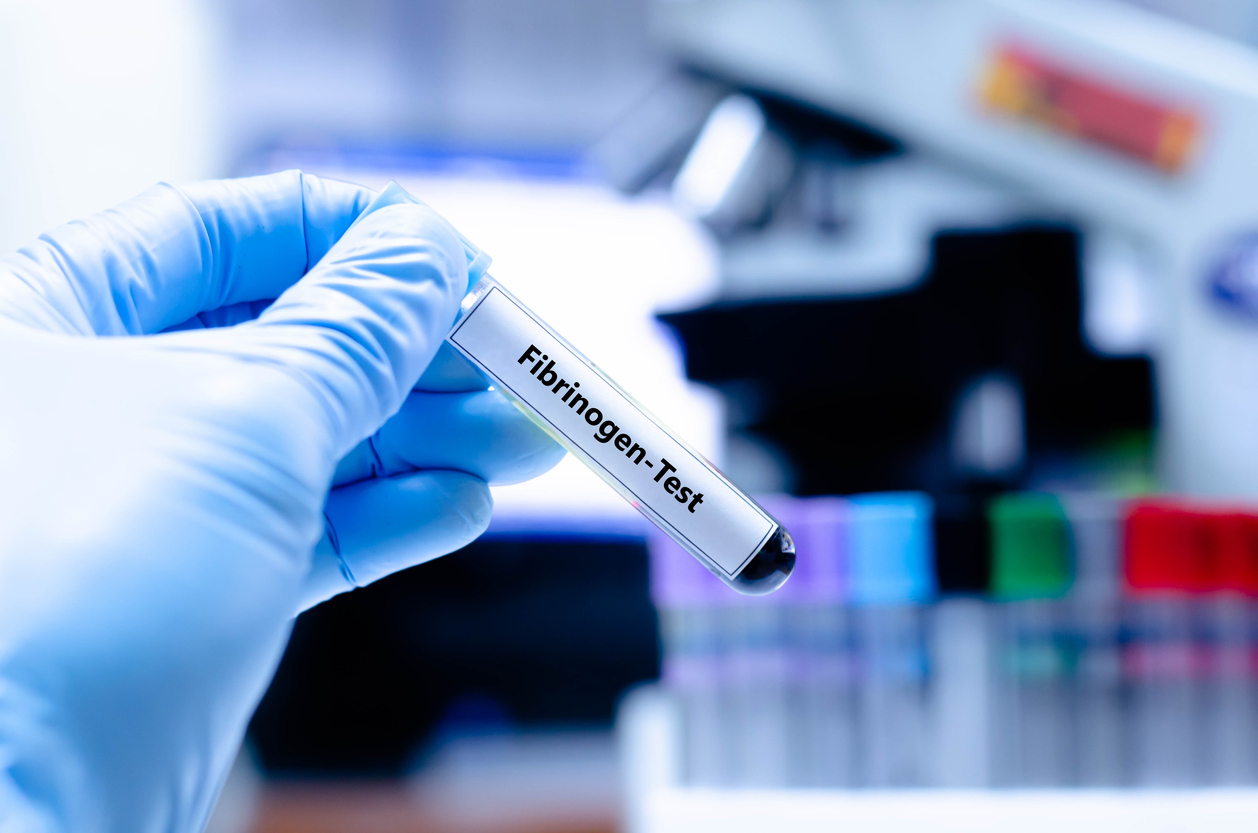2025-08-06
Early fibrinogen: a lifesaving drip?
Cardiology and Vascular Medicine
By Ana Espino | Published on August 06, 2025 | 2 min read
#Fibrinogen #Hemorrhage #Coagulopathy
Traumatic hemorrhage is a leading cause of preventable death in patients suffering from severe trauma, particularly in the first few hours after injury. It is often worsened by acute coagulopathy, which arises within minutes of the trauma and contributes to increased bleeding. Among the early abnormalities observed, fibrinogen deficiency is one of the first factors to be altered and is a key determinant of clot stability.
Despite progress in massive transfusion protocols, the role of fibrinogen remains poorly defined. Practices vary greatly between institutions—both in terms of product choice and timing of administration—though timing may be crucial. Some studies suggest that very early administration, during the initial resuscitation phase, could help prevent hemodynamic collapse, reduce transfusion requirements, and improve survival.
However, direct clinical evidence on this subject remains limited, fragmented, and sometimes contradictory. The main challenge is to robustly demonstrate that early fibrinogen administration significantly improves clinical outcomes without increasing the risk of thromboembolic events.
In this context, this study was initiated to evaluate the effect of early fibrinogen administration on mortality, transfusion needs, and adverse events in patients experiencing severe traumatic hemorrhage.
Twelve studies were included, covering a total of 1,657 adult patients with severe traumatic hemorrhage. Participants were grouped according to the timing of fibrinogen administration, defined as within the first three hours of arrival. The efficacy of the intervention was assessed using the following outcome variables: 24-hour mortality, overall in-hospital mortality, transfusion requirements, and occurrence of adverse thromboembolic events.
The analysis showed that early administration of fibrinogen is associated with a significant reduction in 24-hour mortality, suggesting a real benefit during the acute phase. However, no notable difference was observed in overall hospital mortality, indicating that the immediate benefit may not translate into a long-term survival advantage. A moderate reduction in transfusion needs was also observed, which could help limit complications linked to massive transfusions. Importantly, no increase in thromboembolic risk was found, reinforcing the safety profile of fibrinogen in the acute phase. Nonetheless, the results showed some heterogeneity due to variations in the products used and protocols applied across different study settings.
Traumatic hemorrhage is one of the main preventable causes of death in emergency medicine, often worsened by acute coagulopathy, particularly early fibrinogen deficiency. The major challenge in this pathology lies in timely intervention to correct the deficit by optimizing hemostatic management within the first hours.
The objective of this review was to assess the effectiveness of early fibrinogen administration in reducing mortality and transfusion needs in patients with traumatic bleeding. The findings suggest a real benefit in terms of 24-hour mortality and a moderate reduction in transfusions, without an increased thromboembolic risk. However, the effect on overall hospital mortality remains uncertain, and the heterogeneity of protocols limits the generalizability of the conclusions.
To move forward, large-scale prospective trials are needed to standardize practices, identify the patients who would benefit the most from this strategy, and validate fibrinogen as a reference early intervention in traumatic hemorrhage management protocols.
About the author – Ana Espino
As a scientific writer, Ana is passionate about bridging the gap between research and real-world impact. With expertise in immunology, virology, oncology, and clinical studies, she makes complex science clear and accessible. Her mission: to accelerate knowledge sharing and empower evidence-based decisions through impactful communication.
#Fibrinogen #Hemorrhage #Coagulopathy
Traumatic hemorrhage is a leading cause of preventable death in patients suffering from severe trauma, particularly in the first few hours after injury. It is often worsened by acute coagulopathy, which arises within minutes of the trauma and contributes to increased bleeding. Among the early abnormalities observed, fibrinogen deficiency is one of the first factors to be altered and is a key determinant of clot stability.
Despite progress in massive transfusion protocols, the role of fibrinogen remains poorly defined. Practices vary greatly between institutions—both in terms of product choice and timing of administration—though timing may be crucial. Some studies suggest that very early administration, during the initial resuscitation phase, could help prevent hemodynamic collapse, reduce transfusion requirements, and improve survival.
However, direct clinical evidence on this subject remains limited, fragmented, and sometimes contradictory. The main challenge is to robustly demonstrate that early fibrinogen administration significantly improves clinical outcomes without increasing the risk of thromboembolic events.
In this context, this study was initiated to evaluate the effect of early fibrinogen administration on mortality, transfusion needs, and adverse events in patients experiencing severe traumatic hemorrhage.
Early administration... to save more lives?
Twelve studies were included, covering a total of 1,657 adult patients with severe traumatic hemorrhage. Participants were grouped according to the timing of fibrinogen administration, defined as within the first three hours of arrival. The efficacy of the intervention was assessed using the following outcome variables: 24-hour mortality, overall in-hospital mortality, transfusion requirements, and occurrence of adverse thromboembolic events.
The analysis showed that early administration of fibrinogen is associated with a significant reduction in 24-hour mortality, suggesting a real benefit during the acute phase. However, no notable difference was observed in overall hospital mortality, indicating that the immediate benefit may not translate into a long-term survival advantage. A moderate reduction in transfusion needs was also observed, which could help limit complications linked to massive transfusions. Importantly, no increase in thromboembolic risk was found, reinforcing the safety profile of fibrinogen in the acute phase. Nonetheless, the results showed some heterogeneity due to variations in the products used and protocols applied across different study settings.
Emergency fibrinogen: a future standard of care?
Traumatic hemorrhage is one of the main preventable causes of death in emergency medicine, often worsened by acute coagulopathy, particularly early fibrinogen deficiency. The major challenge in this pathology lies in timely intervention to correct the deficit by optimizing hemostatic management within the first hours.
The objective of this review was to assess the effectiveness of early fibrinogen administration in reducing mortality and transfusion needs in patients with traumatic bleeding. The findings suggest a real benefit in terms of 24-hour mortality and a moderate reduction in transfusions, without an increased thromboembolic risk. However, the effect on overall hospital mortality remains uncertain, and the heterogeneity of protocols limits the generalizability of the conclusions.
To move forward, large-scale prospective trials are needed to standardize practices, identify the patients who would benefit the most from this strategy, and validate fibrinogen as a reference early intervention in traumatic hemorrhage management protocols.
Read next: COVID-19 and coagulation parameters: a link to mortality?
About the author – Ana Espino
PhD in Immunology, specialized in Virology

Last press reviews
Leprosy: a disease still beyond control

By Ana Espino | Published on January 22, 2026 | 3 min read...
Parental alcohol intoxication: the hidden impact on children’s mental health

By Carolina Lima | Published on January 19, 2026 | 3 min read
Obesity: when the kidneys become overwhelmed

By Ana Espino | Published on January 20, 2026 | 3 min read...